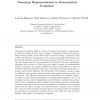Free Online Productivity Tools
i2Speak
i2Symbol
i2OCR
iTex2Img
iWeb2Print
iWeb2Shot
i2Type
iPdf2Split
iPdf2Merge
i2Bopomofo
i2Arabic
i2Style
i2Image
i2PDF
iLatex2Rtf
Sci2ools
146
click to vote
ASC
2010
2010
Genotype representations in grammatical evolution
Grammatical evolution (GE) is a form of grammar-based genetic programming. A particular feature of GE is that it adopts a distinction between the genotype and phenotype similar to that which exists in nature by using a grammar to map between the genotype and phenotype. Two variants of genotype representation are found in the literature, namely, binary and integer forms. For the first time we analyse and compare these two representations to determine if one has a performance advantage over the other. As such this study seeks to extend our understanding of GE by examining the impact of different genotypic representations in order to determine whether certain representations, and associated diversity-generation operators, improve GE's efficiency and effectiveness. Four mutation operators using two different representations, binary and gray code representation respectively, are investigated. The differing combinations of representation and mutation operator are tested on three benchm...
Related Content
| Added | 08 Dec 2010 |
| Updated | 08 Dec 2010 |
| Type | Journal |
| Year | 2010 |
| Where | ASC |
| Authors | Jonatan Hugosson, Erik Hemberg, Anthony Brabazon, Michael O'Neill |
Comments (0)

